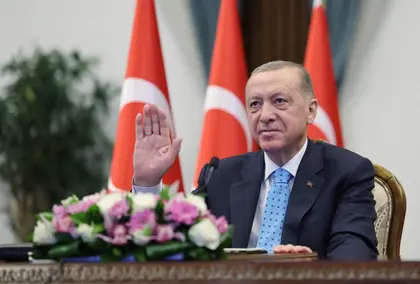Turkish President Recep Tayyip Erdogan on Wednesday, 17 May, announced a two-month extension of a UN-backed deal under which Ukraine ships grain across the Black Sea to global markets.
Erdogan made the announcement one day before it had been due to expire, scoring a diplomatic coup ahead of a May 28 runoff election in which he will try to extend his two-decade rule until 2028.
JOIN US ON TELEGRAM
Follow our coverage of the war on the @Kyivpost_official.
He thanked "my precious friend", Russian President Vladimir Putin, Ukrainian counterpart Volodymyr Zelensky and UN Secretary General Antonio Guterres for their roles in extending the agreement.
"With the efforts of our country, the support of our Russian friends, the contribution of our Ukrainian friends, it was decided to prolong the Black Sea grain deal for two more months," Erdogan said in nationally televised remarks.
Erdogan said Russia had agreed not to block ships from leaving two Ukrainian harbours, expressing hope that the deal would be "beneficial for all the parties".
Kyiv said it was "grateful" to the United Nations and Turkey for their efforts in "strengthening food security".
"These agreements matter for global food security -- Ukrainian and Russian products feed the world," Guterres said, while stressing the need for a more comprehensive, longer-term agreement.
But Russia denounced what it called "disparities" in the implementation of the deal that "should be corrected as quickly as possible".

‘Just Peace’ and ‘Lasting Peace’ – Nations React to Trump’s Inauguration
Ukraine was one of the world's major grain exporters before Russia invaded in February last year.
Russian warships blockaded Ukraine's Black Sea ports, sending food prices soaring on global markets and disproportionately hitting the world's poorest.
- Drawn-out negotiations -
Turkey and the United Nations first brokered a deal between the warring parties in July 2022, which created safe corridors for the export of Ukrainian produce to assuage the crisis.
The deal is still the only one Moscow and Kyiv have signed up to since the war began.
More than 30 million tons of grain and agricultural products have been exported under the initiative to date.
But the agreement has periodically come under threat since then as Russia and Ukraine struggled to agree on renewing it before expiration deadlines.
In March, the agreement was renewed for 60 days instead of the 120 days sought by Ukraine, after Russia laid down a number of conditions, including the right to export fertilizer.
Ukrainian, Russian, Turkish and UN officials met in Istanbul last week to negotiate the latest renewal, which was held up by a separate proposal to resume exports of Russia's ammonia via a pipeline.
Ammonia is a core component of fertilizer, whose export Russia accuses the West of blocking in violation of past deals.
Kyiv has also accused Russia of blocking ships by refusing to register them and conducting lengthy inspections.
Ukraine's attempt to export more of its agricultural produce by land has caused friction with neighboring EU countries where farmers said the price of their produce was being undercut.
- 'Putin gives Erdogan win' -
The announcement was seen as the latest diplomatic success for Erdogan, who failed to clinch outright victory against secular rival Kemal Kilicdaroglu in last Sunday's presidential election.
NATO member Turkey has worked to maintain good ties between Russia and Ukraine, hosting two early but ultimately unsuccessful rounds of peace talks between the warring sides.
The diplomatic overtures have boosted Erdogan's domestic political message of providing responsible statesmanship and increasing Turkish influence in the world.
"Putin gives Erdogan another diplomatic win ahead of the 28 May presidential election run-off," Emre Peker of the Eurasia Group consultancy wrote on Twitter.
You can also highlight the text and press Ctrl + Enter










